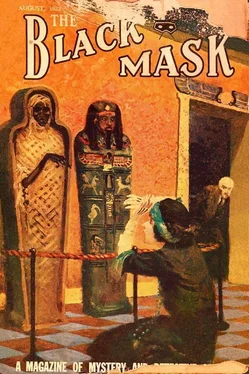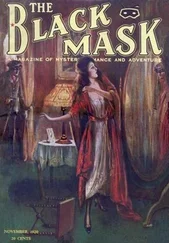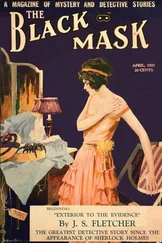John Baer - The Black Mask Magazine (Vol. 5, No. 5 — August 1922)
Здесь есть возможность читать онлайн «John Baer - The Black Mask Magazine (Vol. 5, No. 5 — August 1922)» весь текст электронной книги совершенно бесплатно (целиком полную версию без сокращений). В некоторых случаях можно слушать аудио, скачать через торрент в формате fb2 и присутствует краткое содержание. Город: New York, Год выпуска: 1922, Издательство: Pro-Distributors Publishing Company, Жанр: Детектив, на английском языке. Описание произведения, (предисловие) а так же отзывы посетителей доступны на портале библиотеки ЛибКат.
- Название:The Black Mask Magazine (Vol. 5, No. 5 — August 1922)
- Автор:
- Издательство:Pro-Distributors Publishing Company
- Жанр:
- Год:1922
- Город:New York
- ISBN:нет данных
- Рейтинг книги:4 / 5. Голосов: 1
-
Избранное:Добавить в избранное
- Отзывы:
-
Ваша оценка:
- 80
- 1
- 2
- 3
- 4
- 5
The Black Mask Magazine (Vol. 5, No. 5 — August 1922): краткое содержание, описание и аннотация
Предлагаем к чтению аннотацию, описание, краткое содержание или предисловие (зависит от того, что написал сам автор книги «The Black Mask Magazine (Vol. 5, No. 5 — August 1922)»). Если вы не нашли необходимую информацию о книге — напишите в комментариях, мы постараемся отыскать её.
The Black Mask Magazine (Vol. 5, No. 5 — August 1922) — читать онлайн бесплатно полную книгу (весь текст) целиком
Ниже представлен текст книги, разбитый по страницам. Система сохранения места последней прочитанной страницы, позволяет с удобством читать онлайн бесплатно книгу «The Black Mask Magazine (Vol. 5, No. 5 — August 1922)», без необходимости каждый раз заново искать на чём Вы остановились. Поставьте закладку, и сможете в любой момент перейти на страницу, на которой закончили чтение.
Интервал:
Закладка:
“Then you turned out the lights and watched your chance. You probably had the door open a crack. You saw Murphy pick up the roll of money, stuff it into his pocket and, after looking around to see that he was unobserved, busy himself with his pail and mop. Then, when you were certain that he could see you, you rushed from the office and past him to the stairway.
“Your scheme was clever — diabolically so. I’m intensely human — human enough not to suspect a man who openly confesses that he went to a place to commit a burglary and finds that a murder had been committed. I swallowed your story like a veritable boob.
“You realized that, under ordinary circumstances, you would probably be suspected. Therefore, by coming straight to police headquarters, admitting your premeditated guilt and telling of the murder, you threw any suspicions I might otherwise have had to the winds. I went into the investigation firmly convinced that you were innocent. I might have run into evidence against you, but you had it all discounted in advance.
“You made one fatal mistake. I made the other. Mine nearly hanged poor Murphy, here, while yours will hang yourself.”
Tompkins gulped. Then: “All right, Chief, you’ve got me foul, I guess. I put the money and securities in an envelope addressed to myself and dropped it down the mail chute. It should have been delivered yesterday afternoon at my home address. There’s just one question I’d like to ask:
I nodded. “Fire away.”
“I’ll admit that I thought I had things fixed up so that you wouldn’t suspect me. And besides I’m a pretty fair actor and I pulled the sob stuff pretty decently you’ll admit. But you say that I made one mistake. Do you mind telling me what it was?”
It was my turn to smile.
“Tompkins,” I said, “your story was too perfect. Remember you told me — and you repeated the same story on the witness stand just now — that you seized the knob of the outer door ready to bolt when you heard a moan. You turned quickly, you claimed, and through the door you saw Jones sitting at his desk, his head hanging over the back of his chair, the handle of a knife sticking out of his chest and his breast covered with blood. That’s where you made you big mistake.”
Tompkins looked puzzled.
“I’m still in the dark,” he declared.
“Because,” I answered, “the position of Jones’s desk is such that he was seated with his right side toward the door. He was slumped down in his chair — which is leather upholstered with huge arms, his head hanging over the back and side. It was not until you told your story a second time on the witness stand and I visualized the scene of the crime that the truth suddenly flashed over me.
“From the position of Jones’s desk and the way he was sitting with his right side turned toward the doorway, a man standing at the outer doorway couldn’t see the handle of the knife which was plunged into his heart!”
The Catspaw
by Ward Sterling
I
He Peck mansion was as carefully guarded as a prison. At the front and rear doors armed operatives from the best detective bureau in the city — all tried men — were posted day and night. Others patrolled the grounds. There was not one chance in ten million for anyone to creep through the network of protection we had thrown about the aged millionaire and his family.
Yet the first murder occurred within twenty-four hours of the time set by Lon Bixby!
Lannagan, the second man, did not report for duty in the morning as usual. Jenkins, the butler, entering the room when he did not respond found him cold in death.
The tragedy had taken place some time during the night. The body was cold and rigid when we rushed into the chamber in response to the butler’s frantic calls for help.
Bloated to nearly double his natural size, blackened, the limbs twisted as from convulsions, the face drawn out of shape, the unfortunate man presented a terrifying spectacle.
Doctor Maxwell, Peck’s regular physician, who was locked up in the house with the remainder of us, gave as his opinion after a hurried examination that death was the result of poisoning.
Yet Lannagan had eaten nothing, to the best of our knowledge and belief, that the rest of us had not also eaten. That had been a part of our agreement — that we would all partake of the same food — in order to protect Peck from poison. Nor had anything in the provision line been brought to the house. Prepared to stand a siege, everything — even the fresh meats — had been purchased in advance and stored away in the refrigerating plant downstairs.
Doctor Frye, the coroner, summoned by telephone as soon as the tragedy was discovered, agreed with his colleague that Lannagan had been poisoned. It was his belief, however, that the poison had been administered by injection into a vein.
Both physicians made a careful examination of the body. Just above the knee they found two minute punctures in the skin! Here, too, the swelling seemed more aggravated than elsewhere, while the spot had turned a darker hue.
The body had every symptom of death from snake bite. Yet we knew that there was not a snake in the house nor could there have been one in the room. Lannagan had, according to my instructions, slept with his windows and door locked. They were in this condition when the body was found, for it had been necessary for the butler to let himself into the room with his pass-key. The other servants had locked themselves in in the same way. An alert detective had been posted all night in each corridor.
In spite of the precautions, in order to make certain, we removed every piece of furniture from the dead man’s room. There was no possibility of a reptile having been hidden there. Nor could a man have, in any possible way, entered the house.
To make matters more complicated we knew that Lannagan had not left the house that day nor the day before. For this was a part of the arrangement that we had made.
Ponder as I would, I could think of no possible solution to the puzzle. It was as mysterious as Poe’s “Mystery of the Rue Morgue.”
Peck, the storm center — the man for whom all these precautions were taken and for whom poor Lannagan had died — was the calmest of us all.
Five minutes after the appearance of the coroner, the millionaire was summoned to the phone. In accordance with my determination not to allow him out of my sight day or night, I accompanied him to the library.
A harsh, metallic voice — a voice so loud that it could be heard all over the big room — informed him that the death of a member of his household had been a warning — a warning sent to prove to him that in spite of all his precautions his enemies were able to strike when and where they pleased. His own death would follow in good time.
Shaking slightly, yet game to the core, he motioned to me and handed me the instrument. The voice died out in a mirthless, diabolical chuckle. Then the receiver at the other end of the wire was hung up with a click.
Jiggling the hook up and down, I succeeded in getting “Central” within a few seconds. An instant later I was connected with my friend, Armstrong, manager of the traffic department, to whom I hurriedly explained the situation and requested that the call be traced.
Armstrong moved speedily. For, in spite of the fact that hundreds of calls go through the Capital Hill exchange every hour, so thorough is their system that inside of five minutes he had me back on the wire.
The call had originated in one of the pay stations at the Pennsylvania depot, ten miles away!
II
Perhaps in my efforts to hold the reader’s attention I have not explained matters as thoroughly as I should. Then, too, like all detectives, I am a poor narrator of my own experiences. What seems to the average person to be an exciting adventure is to us only a part of the day’s work — an episode to be forgotten as speedily as possible after it has been disclosed to judge and jury. Yet the Morgan Peck case is so unique in criminal annals as to be worthy of being put in a class by itself.
Читать дальшеИнтервал:
Закладка:
Похожие книги на «The Black Mask Magazine (Vol. 5, No. 5 — August 1922)»
Представляем Вашему вниманию похожие книги на «The Black Mask Magazine (Vol. 5, No. 5 — August 1922)» списком для выбора. Мы отобрали схожую по названию и смыслу литературу в надежде предоставить читателям больше вариантов отыскать новые, интересные, ещё непрочитанные произведения.
Обсуждение, отзывы о книге «The Black Mask Magazine (Vol. 5, No. 5 — August 1922)» и просто собственные мнения читателей. Оставьте ваши комментарии, напишите, что Вы думаете о произведении, его смысле или главных героях. Укажите что конкретно понравилось, а что нет, и почему Вы так считаете.












